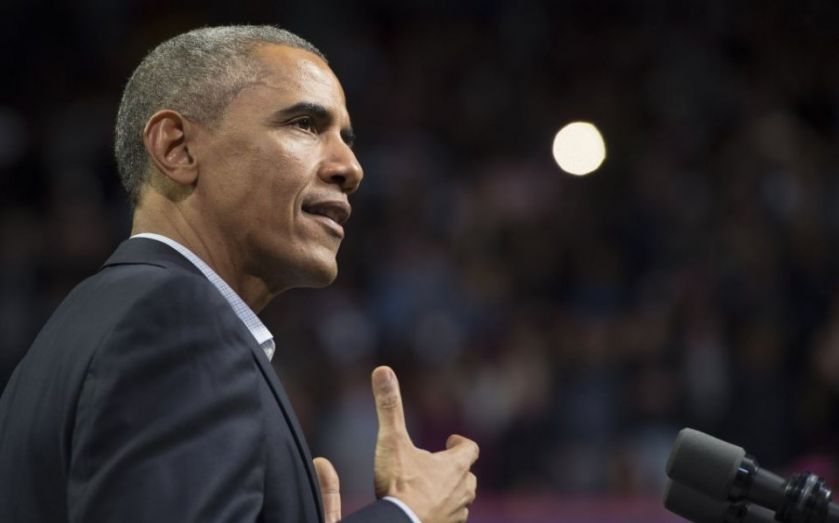US elections: Obama can only salvage his failing presidency if his party loses

There is a lovely story about how the administration of US President John F Kennedy – for all its intellectual glitter and panache – managed to get Vietnam so wrong. Coming back from his first cabinet meeting, vice president Lyndon Johnson told his mentor and great friend Sam Rayburn, a crafty giant of the House of Representatives, how intellectually overpowering the new team was, from national security adviser McGeorge Bundy to secretary of defence Robert McNamara. Rayburn presciently replied, “Well, Lyndon, you may be right and they may be every bit as intelligent as you say, but I’d feel a whole lot better about them if just one of them had run for sheriff once”. And of course, this is the heart of the matter: intellectual brilliance without practical experience can be very dangerous indeed.
I remember thinking of this anecdote when the Obama team – which six long years ago was also thought intellectually impressive and stylish – came to power. However, my variant on the theme went like this: “I wish one of them had managed an ice cream stand,” a reality especially true of the President. And as defeat stares the Democrats in the face in elections to the Senate and House of Representatives tomorrow, this original sin – unfamiliarity with the realities of the world, of how to implement ideas – is precisely what is dooming the White House and its Democratic allies to an electoral rout.
Obamacare, the White House’s signature effort at health care reform, remains desperately unpopular. A CBS News poll on 27 October found that only 36 per cent are in favour, with a decisive 55 per cent against. The botched roll-out of the Obamacare website, an entirely unforced management error, will probably be remembered as the beginning of the end of this once hopeful presidency.
Nor has the White House’s record for competence improved. Islamic State was once disparaged by the President as the “JV team”; an American idiom meaning it was not a serious problem. The Internal Revenue Service, the country’s feared tax-collecting authority, has been mired in scandal as it specifically targeted conservative organisations; either the White House knew about this (which would amount to a crime) or it was managerially asleep at the switch. Over the Ebola crisis, government protocols have been confidently announced, only to change a day later. The VA (Veterans Affairs administration, which looks after elderly and wounded serviceman) has shamefully neglected US soldiers.
In each case, the narrative of Obama morphing from global saviour to flawed manager has amounted to an Olympian fall from grace. This is especially telling for a President who is unabashedly (unlike Bill Clinton) on the centre-left of the Democratic Party, apostles of the American progressive creed. But Progressivism – with its belief in an ever-larger role for a government run by technocrats who know better – can only work if those in charge are competent managers. Any American who has ever tried to get their driver’s license renewed knows better.
For almost no one alive wants big, intrusive, and incompetent governance. And that notion, more than anything else, is what is dooming the Democrats to defeat tomorrow. If you are the party of government, and government effectiveness is found wanting, it is bound to be a long electoral night.
But there is an unmerited ray of sunshine for the President. For it is the Democratic leader in the Senate Harry Reid – normally a staunch ally of the White House – who has almost single-handedly stalled its major foreign policy initiatives, the huge putative trade deals with Asia (the Trans-Pacific Partnership, or TPP) and Europe (the Trans-Atlantic Trade and Investment Partnership, or TTIP). These have the potential to do nothing less than fundamentally secure closer economic and political links with America’s allies in both pivotal continents.
In thrall to the unions and fearing a backlash from the increasingly protectionist Democratic Party base, Reid refused to bring Trade Promotion Authority (TPA) to the Senate floor, despite the President asking him to do so in January 2014. TPA allows for a simple up-or-down congressional vote on trade deals, and is the only practical way they can be enacted. Easily discouraged, Obama declined to challenge his ally.
But with the more free trading Republicans in charge of the Senate, there is every chance TPA can be adopted. This is plainly good for the country; ironically, it is also very good for the stalled administration, which years from now is likely to point to the enactment of both trade deals as the moment when the US began to craft the shape of the multipolar era.
Dr John C Hulsman is senior columnist at City A.M. He is a life member of the Council on Foreign Relations, and author of Ethical Realism, The Godfather Doctrine, and Lawrence of Arabia, To Begin the World Over Again. He is president and co-founder of John C Hulsman Enterprises (www.john-hulsman.com), a global political risk consultancy, and available for corporate speaking and private briefings at www.chartwellspeakers.com